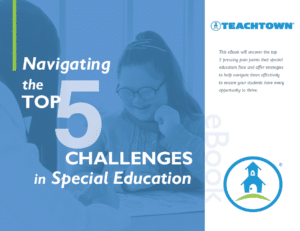 Life is full of challenges. Whether you’re trying to figure out how to add more hours to the day to check off every box on your to-do list, or trying to be in two places at once, it comes as no surprise that each day presents new, daily obstacles. This rings especially true for special educators.
Life is full of challenges. Whether you’re trying to figure out how to add more hours to the day to check off every box on your to-do list, or trying to be in two places at once, it comes as no surprise that each day presents new, daily obstacles. This rings especially true for special educators.
While working with students with moderate to severe disabilities can be incredibly rewarding, it also poses its own set of unique challenges. The one-size-fits-all instructional approach that may work in general education cannot be replicated for students receiving specially designed instruction and related services (and rightfully so!). A personalized approach to learning for special education students requires careful consideration and a solid understanding of the federal education laws in place to protect our student population.
In this eBook, we will uncover the top 5 pressing pain points that special educators face and offer strategies to help you navigate them effectively to ensure your students have every opportunity to thrive.
 First up – appropriate rigor! In special education it is necessary to provide students with moderate to severe disabilities access to educational opportunities that are both challenging and meaningful, while also recognizing their individual learning needs. Academic rigor refers to the level of difficulty and complexity of instruction, which we know plays a key role in learning.
First up – appropriate rigor! In special education it is necessary to provide students with moderate to severe disabilities access to educational opportunities that are both challenging and meaningful, while also recognizing their individual learning needs. Academic rigor refers to the level of difficulty and complexity of instruction, which we know plays a key role in learning.
Providing an appropriate rigor that is based on the general education curriculum will help your students remain motivated, while challenging them on an individual level. When students are taught within their zone of proximal development (think Goldilocks and The Three Bears – not too easy, not too hard, but just right!), the result will be a boost in confidence and academic performance.
Yet, while the benefits are clear cut, many schools struggle to provide appropriate rigor for students with disabilities for several reasons.
One reason? Lack of funding. With a lack of funding generally comes a lack of resources. In special education, trained teachers and service providers, along with access to an adapted core curriculum and learning interventions, are imperative to student success. Schools with limited budgets struggle to offer these differentiated resources, resulting in inappropriate rigor for students. Some students with disabilities will have difficulty accessing the instruction and activities because they don’t have the appropriate level of support to engage with the learning materials, and other students may miss opportunities to reach their full potential.
Another reason? Lots of schools across the nation are dealing with high teacher turnover and staff shortages, especially in special education departments. With teachers and service providers leaving the profession at a faster rate than new hires entering it, it can be challenging to maintain consistency and continuity of instruction. This ultimately impacts the quality of education that is offered to students.
We mentioned trained teachers above…This is another contributing factor as to why many schools find it challenging to provide special education students with appropriate rigor. Without specific training in low-incidence disabilities, newer special educators may not have the expertise to effectively adapt the general education curriculum to meet the needs of students with disabilities.
What about access to an adapted curriculum? Certain schools may already have a set curriculum in place for all students which isn’t, or cannot easily be, adapted to meet the needs of students with disabilities. If special education students do not have access to a standards-based, adapted curriculum that provides access to the general education curriculum, it is likely they are not going to be appropriately challenged at a level that meets their abilities. In this case, students may end up watching educational videos on YouTube frequently, OR they may interact with the same preferred activities repetitively.
Rather than providing academic rigor that addresses the unique needs of students with moderate to severe disabilities, some schools place more focus on teaching specifically to standardized tests. On the other hand, some schools place a large curricular focus on standardized tests. Prioritizing instruction to prepare students on standardized tests is understandable, particularly when a school or district is under the oversight of an improvement plan and resources are tied to growth measured by standardized tests. However, our most complex learners may access alternative assessments. Students who are appropriate for alternative assessments require a core curriculum that has been adapted to their learning needs.
There are federal laws in place to support students with disabilities and their right to a free and appropriate public education (FAPE). When these laws, like the Individuals with Disabilities Education Act (IDEA), are not upheld and students are not receiving access to a meaningful and equitable and inclusive education (academic rigor!) – districts can be met with litigation.

Schools are federally mandated to provide students with disabilities access to specially designed instruction and services.. If a school fails to provide eligible students with these services, legal action can be taken to ensure the students’ rights are protected. What can this look like:
Does this place Gerald’s school out of compliance? YES.
Can Gerald’s family pursue legal action against the school? YES.
Why else can legal action be pursued? Under the American with Disabilities Act (ADA), schools are required to provide equal access to education for students with disabilities.
Similarly to what happens if IDEA is not upheld, if ADA is not upheld, schools are at risk again for litigation.
Does this place Molly’s school out of compliance? YES.
Can Molly’s family pursue legal action against the school? YES.
Examples like the ones mentioned above are a reality for districts across the country. Just recently, a school district in MI made the news for failing to provide a free and appropriate education (FAPE) under IDEA for a student, Miguel Perez.
Following legal proceedings, the MI school district settled the claim under IDEA. What happened next? Perez’s family then filed with the Federal Court for compensatory damages under the Americans with Disabilities Act (ADA). The Federal Court dismissed the Perez family’s new case since the original claim was already settled under IDEA. After the Perez family appealed this decision, the Supreme Court overturned the lower court’s ruling in Perez’s favor.
What does this mean for districts? Families are pursuing every avenue of justice available to them to- and rightfully so, which makes upholding special education laws for districts the highest priority.
To put it simply, if a school does not uphold special education law, there is a very real risk of heading to court. It is essential that schools work proactively to ensure they are meeting the needs of all students (through avenues like adapted curriculum that provides access to the general education, OR providing accessible handrails in buildings) and maintaining compliance.

Let’s first address WHY special educators are leaving the profession. First and foremost – special educators have a tremendous workload that includes writing IEPs, collecting and analyzing student data, collaborating with multidisciplinary team members, completing compliance paperwork and delivering individualized instruction for all students. That’s A LOT. This significant workload often leads to increased stress, and in turn, higher levels of burnout.
We’re all familiar with the ties between high workload and burnout. Think about how this plays out in your personal life, too:
For special educators, feeling alone in this uniquely demanding workload can be frustrating, especially since most of their colleagues in general education don’t have the same experiences. When all of this frustration boils over, what happens? Some teachers decide it’s time to move on. Then what happens? Schools are left facing unprecedented staff shortages, and in turn less experienced special educators, to meet the individual needs of our complex learners. This is one way the threat of litigation can increase.
Not only are schools in need of educators, but they are also in need of good data to support learning outcomes.

Good data is key in helping special educators make informed decisions about the instructional strategies and interventions that are most effective for their students. In addition to data being helpful, the collection of data is a requirement set forth by the Individuals with Disabilities Education Act (IDEA). Schools must collect data for students receiving special education and related services to monitor progress and ensure that the appropriate services are being provided to our most complex learners.
However, there are common barriers that prevent some special education teachers from collecting and using good data. One particular barrier? Lack of consistency across data collection within a district. Having access to consistent data. Every school is unique and the software or processes to collect and use data may vary within the same district. This poses the risk of inconsistent or inaccurate types of data within the same district. Data collected for James in an Elementary school in a suburban district can vary drastically from what data is being collected on Jen in a High School of the same district. For example, James’ teacher has access to enCORE, which provides usage, growth, and standards-based reporting for his progress in the adapted core curriculum. Jen’s teacher does not have access to enCORE or any other comprehensive core curriculum, so she must piecemeal curriculum and write her own assessments. The end results? Data collection and progress monitoring for these two students looks quite different.”
On the other hand, while some schools have access to impactful resources and data collection software, for many schools the lack of funding (or lack of knowledge about allowable uses for the funding), overextended staff, limited training and access to the best learning technologies, all make it challenging to both collect and use data effectively. Outdated or insufficient technology certainly impacts the ability of special educators to track and record consistent student data.
Addressing the barriers that prevent special educators from collecting and using data will help ensure students with moderate to severe disabilities receive the support they are federally required to receive and need to thrive.
In special education, another hot button topic frequently discussed is equitable and inclusive learning.
Raise your hand if any of those questions have popped up in conversations you’ve had!
Providing students with disabilities with access to an equitable and inclusive education means that they receive access to the general education curriculum and learn alongside their typically developing peers to the maximum extent possible.
And although school districts may be putting forth their best effort to educate their most complex learners, often they do not have the funding, training, and/or resources to provide an equitable and inclusive education for all students.

Often, special education students don’t have access to culturally-responsive, and socially and developmentally appropriate instruction. Why not? Funding for one reason. High-quality adapted core curriculum for a district can be pricey, and although worth every penny, allocating funds in a school budget is no easy task. Our student population deserves to have access to instruction that avoids stereotyping and represents what they are experiencing in real life.
Additionally, access to assistive technology, like speech-to-text software, or augmentative and alternative communication (AAC) devices, iPads, or other devices that support student communication is necessary to support equitable and inclusive learning for many. Consider the barriers to an equitable and inclusive education when the students who need assistive technology don’t have access.
All students regardless of ability deserve to access equal educational opportunities.
Now that we have fully outlined the specific challenges that many schools and special education departments are facing today, how can we relieve some of the burden to support students with moderate to severe disabilities?
Say hi to TeachTown!
As the leading provider of K-12 standards-based, adapted core curriculum, TeachTown is committed to measurably improving the academic, behavioral and adaptive functioning of students with disabilities, including autism and other intellectual and developmental disabilities.
Composed of a team of BCBAs, PhDs, SLPs, and veteran educators, our team has been where you are on the front lines of special education, and not only do we recognize the unique challenges that you face as a special educator, but we understand what our complex learners need to be successful.
Our adapted core curriculum, enCORE, and supporting learning interventions have been designed to provide educational pathways that are built on evidence-based practices to promote positive learning outcomes, alongside ease and efficiency for the educators who implement them.
Here’s how 👇

enCORE offers instruction that is just right for each of your students. How?
While enCORE is the comprehensive, academic core of the learning experience, TeachTown offers learning interventions, including TeachTown Basics, Social Skills and Transition to Adulthood, that all work together to support adaptive, social, emotional, and behavioral needs – a whole child approach!
TeachTown solutions are grounded in the evidence-based practices that have been shown to be effective for students with moderate to severe disabilities in formal research studies. Our core academic curriculum is aligned to state and national standards and provides extensive data and reporting options to help measure student progress. Not only do we help districts deliver a whole child education for students with significant support needs, we also help you maintain compliance with federal education law.
Interested in more information about TeachTown, our curriculum & interventions, and how we can help you navigate the top 5 challenges in special education? Schedule some time to chat 1:1 with a member of our team!
Contributor Bio
